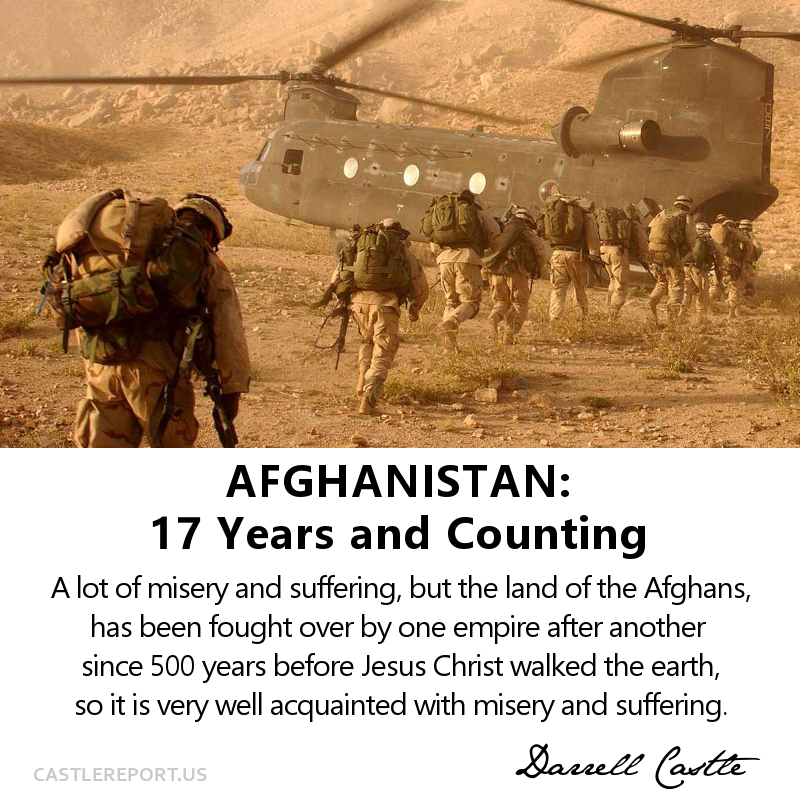
Afghanistan – 17 Years and Counting
Podcast: Download
Darrell Castle talks about the United States’ involvement in Afghanistan long after Osama bin Laden’s death and questions the real reasons we are still in Afghanistan after 17 years of war.
Transcription / Notes:
AFGHANISTAN—17 YEARS AND COUNTING
Hello, this is Darrell Castle with today’s Castle Report. Today is Friday, November 30th 2018, and on today’s Report I will spend my time talking about the United States presence in Afghanistan. Sometimes we forget that our sons and daughters are still fighting there, and I don’t want that to happen, so periodically we take a look.
Since the United States entered Afghanistan in 2001, 2,313 members of the American military have been killed there. You can raise that total by three, since three more were killed this week. In addition, 1,720 civilian contractors have been killed, 20,320 Americans have been wounded, and once again raise that number by three as a result of the same attack this week.
Americans aren’t the only ones who have died in this war, however. The coalition dead, in addition to the Americans, would raise the total by about 1200. Just since 2015, 28,500 friendly Afghan military have died, and during the entire war an estimated 31,000 civilians have died. In total the Afghan dead including enemy, friendly, and civilian is listed at 111,000.
That’s a lot of misery and suffering but Afghanistan, or land of the Afghans, has been fought over by one empire after another since 500 years before Jesus Christ walked the earth, so it is very well acquainted with misery and suffering. In 500 B.C., Darius the 1st of Babylonia conquered what is now Afghanistan, and then Alexander the Great in 329 B.C., among many others. Genghis Khan conquered there in the 13th century, but during the 1700’s it was united as a single country with Islam as the uniting force, having been invaded and fought over by a long series of Arab conquerors.
In the modern era, Great Britain invaded Afghanistan on two different occasions, losing about 15,000 soldiers total in both efforts. The Russians came in 1979 and left in 1989, with 15,000 dead as well. The Americans entered Afghanistan on October 7, 2001, and are still there 17 years and counting. Why did Washington invade Afghanistan, and why is Washington still there more than 17 years later, still dying and still killing?
We know that Osama bin Laden was the 911 mastermind and we know that he was hiding in some caves in Afghanistan and we know that demand was made upon the Taliban to turn him over or face the consequences. The Taliban said first of all we do not have him, and second show us the evidence of his guilt. As I recall, not much evidence of guilt was ever made public but a bombing campaign, followed by an invasion, was begun on October 7, 2001.
We were going to get bin Laden. President Bush said “we are going to get him dead or alive” On May 2, 2011, President Obama sent a Seal Team into Pakistan, which then killed bin Laden. We all remember the President and Secretary of State Hillary Clinton, along with the cabinet and staff, watching on live television. That is the story we must believe because that is the official version, and if you believe anything else you will never be accepted as a rational person again. You cannot and must not believe that bin Laden died of kidney disease in 2006, although you may find ample evidence of that.
Whenever he died, Osama bin Laden is dead, and if killing him was the reason America went to war, that reason ceased to exist more than 7 years ago. We are still there and we have suffered many deaths since then so there must be some other reason. Perhaps we are there to keep Muslim terrorists from using it as a training base; after all, there have been no more 911s since we invaded. Of course, I have to remind you that Saudis did the 911 attacks, not Afghans. Osama bin Laden was a Saudi apparently living in Afghanistan, but no matter whether he was killed by President Obama or kidney disease, he is long since dead.
Well, then how goes the war right now? This very week 3 soldiers were killed in an I.E.D. attack that also wounded 3, as well as wounding one civilian contractor. In late October, a Taliban infiltrator managed to get hired as an elite Afghan guard, although he was only a teenager with a fake ID. He got close enough to the top that he was just a few feet from the commanding general of United States and NATO forces in Afghanistan. He raised his Kalashnikov rifle and started firing automatic bursts into the soldiers gathered there. The top Afghan general in Afghanistan was killed, along with several other Afghan officials. An American general was wounded and the U.S. Commanding General barely escaped.
So after more than 17 years of war, it appears that American and Afghan forces are still very vulnerable to infiltration and insider attacks. The scramble to evacuate the American General led to a brief firefight between American and Afghan forces. Like so many wars the United States has fought it is difficult if not impossible to tell friends from enemies, especially when all you have to go by is their uniforms. Every American who trains an Afghan, or works closely with Afghan soldiers and police, must be constantly vigilant lest his friend turn his weapon on him.
So what now, what do we do now that everything has been accomplished and yet nothing permanent seems to have been gained? Afghanistan is often referred to as the graveyard of empires, but whether it deserves that reputation or not, it is definitely a place easy to get into but very difficult to get out of. Hundreds of billions of dollars if not trillions of dollars have been expended there along with thousands of lives and for what.
It seems now that the United States is looking for some face-saving way out of the Afghan tar pit. It is obvious to me that we will have to remain in Afghanistan forever, and possibly make an even bigger commitment, if we are to control who rules the country in the future. If that is obvious to me, then it is obvious to those in Afghanistan as well. The Taliban have probably known from the beginning that if they held on long enough we would have to negotiate for a safe way out
In that regard, we are attempting to negotiate a peace deal with the Taliban, an organization that we have been fighting for more than 17 years. Imagine that there may be Taliban and Americans fighting each other who weren’t even born when the war started, but here they are fighting over this ancient land. Perhaps their fathers also fought each other as well. In the case of the Afghan, it is virtually certain that those things have happened. It’s really mind boggling, but I guess we get numb to it after a while. When you see the horror of war the first time it is just that, horror, but after a while you just get numb and it seems normal, and 17 years is more than enough time for numbness to set in.
So we negotiate with these people knowing that any agreement we make once we are gone is not worth the paper it is written on. No agreement for shared power with an American friendly group will hold once the American military is gone and everyone knows it. What we really seem to be looking for is a way to conduct a safe retreat without attracting all the players in Afghanistan to attack at once when they sense that we have lost and are retreating. Perhaps Taliban agreement can be reached to allow a successful and safe retreat for American forces thus turning the country back to where it was 17 years ago.
We have intervened in another’s civil war, and I suppose we believed that this time it would be different. What we found was profound differences in our way of life and the way of life among the Afghan, whether friend or foe. Our religion is different; our soldiers are better equipped, better fed and better paid than friend or foe. We don’t seem to understand that the actions of our enemies, and probably our supposed friends as well, are driven by ideology. They actually believe that the words written in a book during medieval times should still guide their actions today. The cynical, nihilistic, mindset of the new America finds it difficult to understand such people. I suppose we enter these conflict zones of the world thinking that there are a group of people there who want to be just like us and all they need is a little encouragement, and US military support.
But we, in our flawed nature as people, as human beings have the same impulses to lie, cheat, steal, and destroy as those we are fighting. We, however, possess the awesome power of the United States military at our disposal, and I am afraid that fact makes us potentially more dangerous than those we fight. That is why it is so vitally important to keep those who wield military power honest and within Constitutional guidelines.
President Obama was criticized for micromanaging the war and superseding his generals when he had no experience to do so. President Trump famously said that he would let the generals fight the war. Well, that is fine tactically, but strategy is his and control and command is his, and should not and cannot be successfully avoided for long.
Someone once said that nations have no permanent friends or allies only permanent interests. What are the permanent interests of the United States today? Are the Saudis permanent friends, no matter what, and if the answer is no, then what would they have to do in order for the United States to conclude that it has other, more important, more permanent interests?
What is United States foreign policy today? Do we have a foreign policy, or are we just wandering around a nuclear armed world like a bull in a china shop?
Finally folks, I ask you again, what should we do? I suggest the following: Get out of Afghanistan as quickly as possible, with all possible haste that safety of the troops will allow. Withdraw the United States military from the Middle East, and most of the rest of Asia as well. Get out of NATO and the United Nations and come home to defend America. We can defend 140 nations around the world but we can’t defend our own border. How is that any way to run a free country?
At least that’s the way I see it.
Until next time folks,
This is Darrell Castle.
Thanks for listening.






6 Comments
JONATHAN TAUB
1)the u.s. should get out of the mid east and stop fighting wars for the petro dollar,oil companies,saudia arabia and israel
2)the u.s. should get out of the u.n. and nato
3)the u.s. should have a strong southern border and people who want to immigrate must do so in a lawful manner
4)the u.s. should curtail immigration from poophole countries (i.e. people of african/muslim heritage)
does that about sum it up for the constitutional party?
am i putting words in your mouth?
am i leaving anything out?
please do tell!
Bill Bessonett
Thanks brother, another great report. I am inclined to agree with your final recommendation. However, “And when you hear of wars and tumults, do not be terrified, for these things must first take place, but the end will not be at once.” Notice the word “must.” But with thst said, thank you again for your efforts to preserve and protect I am sure your reward will be great. It is important to fulfill your calling and be obedient regardless of whether or not it appears that your labor will bear the fruit that you desire.
Darrell
Thank you Bill.
Darrell
Thank you Bill.
Rob Snider
Just pondering but is not Afghanistan not a world leader in the production of poppy, which is source for opium; thus could it be that our children are dying to protect the interest of the pharmaceutical companies mass producing and creating an American opioid crisis?
Darrell
Probably not Rob. I can see the arguments for why it appears that American troops protected poppy farmers in the early days of the war but the american statement was always because they need poppy’s to survive otherwise the Taliban would get them. In the case you posed, the opioid crises is caused by synthetic ingredients. The big pharmaceutical companies like to make their own drugs or import them from China.